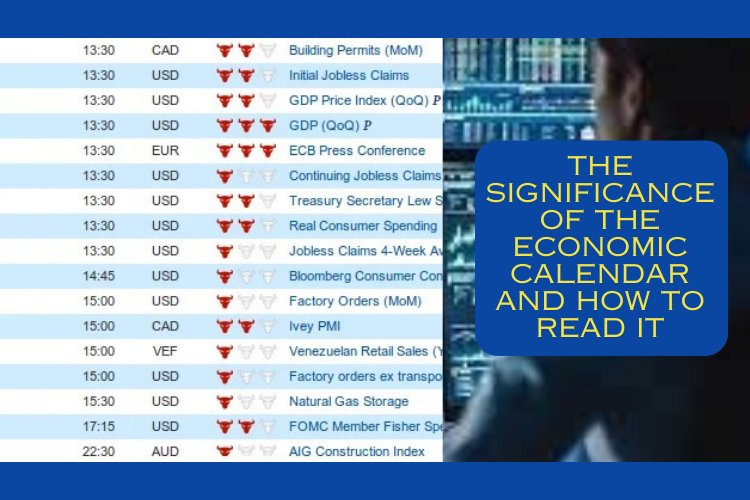The significance of the economic calendar and how to read it
Master the market dance! Unravel the secrets of the economic calendar, predict trends, and make informed investment decisions. Your guide to navigating economic data like a pro.

Understanding Economic Calendars
The economic calendar serves as a crucial tool for financial planning, offering a comprehensive overview of significant economic events and indicators. Its primary function is to provide individuals and organisations with essential information to make informed decisions regarding their financial strategies. Understanding the components of the economic calendar and knowing how to interpret and analyse the data are fundamental for navigating the complexities of the financial landscape. By staying informed about key economic events and indicators, individuals can effectively plan their financial activities, anticipate market movements, and make well-informed investment decisions.
The significance of the economic calendar cannot be overstated, as it acts as a guiding compass for those involved in various financial activities. Whether it's monitoring important economic releases or tracking major events that could impact financial markets, the economic calendar plays a pivotal role in shaping financial planning and decision-making processes.
The Significance of Financial Events
Financial events play a pivotal role in shaping the dynamics of financial markets and influencing investment decisions. These events encompass a wide range of economic indicators, reports, and announcements that have the potential to significantly impact various aspects of the financial landscape. Understanding the importance of economic events is crucial for individuals and organisations engaged in financial planning and investment activities.
Importance of Economic Events
-
Economic events, such as GDP releases, unemployment reports, and interest rate decisions, have a profound impact on financial markets. These indicators provide valuable insights into the overall health of an economy, influencing investor sentiment and market trends.
-
By closely monitoring economic events, individuals can gain a deeper understanding of prevailing economic conditions, which is essential for making informed investment decisions and adjusting financial strategies accordingly.
Market Reaction to Events
-
It is imperative to comprehend how the market reacts to different economic events. Positive or negative surprises in economic data can trigger significant movements in stock prices, currency exchange rates, and commodity markets.
-
Investors and financial planners need to stay attuned to these reactions to effectively navigate market volatility and capitalise on opportunities while mitigating the risks associated with sudden market fluctuations.
By recognising the significance of economic events and understanding their impact on financial markets, individuals can enhance their ability to make well-informed decisions regarding their investments and overall financial planning strategies.
Key Indicators
Essential Economic Indicators
-
GDP, or gross domestic product, serves as a critical measure of a country's economic performance, reflecting the total value of all goods and services produced within its borders. It provides valuable insights into the overall health and growth trajectory of an economy.
-
Unemployment rates indicate the percentage of the labour force that is currently unemployed and actively seeking employment. Fluctuations in unemployment rates can signal shifts in economic conditions, impacting consumer spending and investment patterns.
-
The Consumer Price Index (CPI) measures changes in the prices paid by consumers for a basket of goods and services. This indicator is essential for understanding inflationary pressures within an economy and their potential impact on purchasing power and interest rates.
Interpreting Key Indicators
Understanding the significance of key indicators is paramount for effective financial planning and market analysis. Each indicator offers unique insights into different aspects of an economy, allowing individuals to assess trends, anticipate changes, and make informed decisions regarding investments and financial strategies.
By comprehensively analysing these indicators, individuals can gain a deeper understanding of prevailing economic conditions, identify potential risks or opportunities, and adjust their financial plans accordingly. These key indicators serve as fundamental tools for evaluating economic performance, shaping market trends, and informing strategic financial decisions.
It's essential to recognise that each economic indicator contributes valuable information about specific aspects of an economy. By interpreting these indicators collectively rather than in isolation, individuals can develop a more comprehensive understanding of economic trends and their potential implications for financial planning.
Analysing Economic Indicators
Data Interpretation
-
When analysing economic indicators, it is crucial to interpret the data accurately to understand its implications for financial markets. This involves delving into the details of each indicator and comprehending how it reflects the current economic landscape.
-
Data interpretation requires a meticulous approach, as even subtle changes in key indicators can have significant repercussions on market sentiment and investment strategies. By examining historical trends and comparing current data against past performance, individuals can gain valuable insights into potential market movements and adjust their financial plans accordingly.
-
Utilising statistical tools and analytical methods can aid in interpreting economic data effectively. These tools help in identifying patterns, correlations, and anomalies within the data, providing a comprehensive understanding of the underlying economic conditions.
Data interpretation is not merely about understanding the numbers; it's about deciphering the story they tell about the state of the economy and its potential impact on financial markets.
Market Impact
-
Understanding how economic indicators influence market analysis is essential for making informed decisions regarding investments and financial planning. Economic indicators have a direct impact on market sentiment, influencing investor behaviour and shaping overall market trends.
-
Positive or negative surprises in economic data can trigger significant movements in various financial instruments, including stocks, bonds, currencies, and commodities. Therefore, being cognizant of how different indicators affect market dynamics is crucial for anticipating potential risks and opportunities.
-
Market impact analysis involves assessing how specific economic releases or events are likely to influence asset prices, interest rates, exchange rates, and the overall investment climate. By staying abreast of these influences, individuals can make well-informed decisions regarding their investment portfolios and long-term financial strategies.
Influence on Market Analysis
Economic data and market trends
The relationship between economic data and market trends is intricate and profound. Economic data serves as a fundamental driver of market movements, influencing the behaviour of investors, businesses, and policymakers. By providing crucial insights into the overall health and performance of an economy, economic indicators shape market sentiments, investment strategies, and the allocation of resources.
Key economic indicators like GDP growth rates, employment figures, inflation levels, and consumer spending patterns have a significant impact on market trends. Positive or negative changes in these indicators can lead to shifts in market dynamics, impacting asset prices, interest rates, exchange rates, and overall investment climates. As a result, staying informed about economic data is essential for understanding prevailing market trends and making well-informed decisions regarding financial activities.
The interplay between economic data and market trends highlights the importance of considering macroeconomic factors when analysing investment opportunities. Investors often rely on economic indicators to gauge the direction of markets and identify potential areas for growth or risk. By recognising the influence of economic data on market trends, individuals can adapt their investment strategies to align with changing economic conditions and capitalise on emerging opportunities while mitigating associated risks.
Strategic Investment Decisions
Making strategic investment decisions based on economic indicators is a cornerstone of effective financial planning. Economic data provides valuable insights into the underlying strengths and vulnerabilities within an economy, guiding investors in identifying sectors or assets that are poised for growth or facing potential challenges.
By leveraging economic indicators to inform their investment decisions, individuals can adopt a proactive approach to portfolio management. For instance, positive GDP growth figures may signal opportunities for investing in sectors that benefit from increased consumer spending or business expansion. Conversely, rising unemployment rates may prompt investors to reevaluate their exposure to industries sensitive to consumer discretionary spending.
It's important for investors to recognise that strategic investment decisions should be grounded in a comprehensive analysis of economic data, taking into account both short-term fluctuations and long-term structural changes within an economy. By integrating economic insights into their decision-making processes, individuals can enhance their ability to navigate evolving market conditions effectively.
Strategic decision-making
When it comes to strategic decision-making in the realm of financial planning, utilising economic data is a crucial component for achieving long-term success. By integrating relevant economic indicators into the decision-making process, individuals and organisations can gain valuable insights that inform their strategic moves in the financial landscape.
Utilising Economic Data
Utilising economic data involves leveraging key indicators and reports to make informed decisions about investment strategies, portfolio allocations, and overall financial planning. By analysing indicators such as GDP growth rates, unemployment figures, and inflation levels, individuals can identify trends, anticipate market movements, and align their financial activities with prevailing economic conditions.
Effective utilisation of economic data also entails staying abreast of major economic events and releases that have the potential to impact financial markets. By incorporating these events into their strategic decision-making processes, individuals can proactively position themselves to capitalise on opportunities or mitigate the risks associated with market volatility.
Furthermore, utilising economic data for strategic decision-making requires a comprehensive understanding of how different indicators interplay with each other and influence overall market dynamics. This holistic approach enables individuals to make well-informed decisions that are grounded in a thorough analysis of economic conditions and their potential implications for financial activities.
Risk Management
Understanding economic indicators is instrumental in effective risk management and prudent financial planning. Economic data provides valuable insights into potential risks associated with market fluctuations, policy changes, and global economic shifts. By comprehensively analysing key indicators, individuals can identify areas of vulnerability within their portfolios or investment strategies and take proactive measures to manage these risks effectively.
Moreover, economic data aids in assessing the impact of external factors on investment performance and overall financial stability. By monitoring indicators such as interest rate decisions or trade balances, individuals can adjust their risk exposure accordingly to mitigate potential adverse effects on their financial positions.
In essence, integrating economic data into risk management practices allows individuals to make informed decisions about diversification strategies, hedging techniques, and asset allocation based on a comprehensive assessment of prevailing economic conditions and potential risk factors.
Varieties of Economic Data
The field of economic data encompasses a wide range of information that provides valuable insights into the performance and trends within an economy. Understanding the various types of economic data is essential for gaining a comprehensive understanding of market analysis and making informed financial decisions.
Types of Economic Data
-
Employment Data: This category includes information such as non-farm payrolls, jobless claims, and labor force participation rates. Employment data offers critical insights into the labour market's health, indicating trends in job creation, unemployment levels, and workforce dynamics.
-
Trade Data: Trade data encompasses details about a country's imports, exports, trade balances, and tariffs. Analysing trade data helps in understanding the international trade relationships of a nation, identifying potential impacts on currency valuations, and assessing the overall balance of payments.
-
Monetary Policy Data: This type of data focuses on central bank activities, interest rates, money supply, and credit conditions. Monitoring monetary policy data is crucial for comprehending the direction of interest rates and inflationary pressures within an economy.
-
Business Surveys: Business surveys provide qualitative assessments from companies regarding their expectations, investment plans, and overall business conditions. These surveys offer valuable forward-looking indicators that can shape market sentiments and investment strategies.
-
Housing Market Data: Information related to housing starts, building permits, home sales, and mortgage rates falls under this category. Housing market data offers insights into consumer sentiment, construction activity levels, and real estate market trends.
Interpreting data trends
Interpreting data trends involves analysing historical patterns and identifying potential future developments based on past performance. It is essential for making informed financial decisions by anticipating shifts in market dynamics.
By examining economic data trends across different categories, such as employment figures, trade balances, monetary policy actions, business sentiments, and housing market indicators, individuals can gain valuable insights into the evolving economic landscape. Identifying upward or downward trends in specific areas provides a basis for adjusting financial strategies to align with prevailing economic conditions.
Furthermore, interpreting data trends allows individuals to anticipate potential risks or opportunities within financial markets by recognising patterns or anomalies in economic indicators. This proactive approach enables informed decision-making that takes into account the broader economic context rather than isolated data points.
Investment Considerations
When it comes to investment considerations, understanding economic indicators is paramount for effective financial planning and decision-making. By incorporating key economic data into the planning process, individuals and organisations can gain valuable insights that inform their investment strategies and overall financial activities.
Financial Planning
Financial planning relies heavily on the analysis of economic indicators to chart a course for future financial activities. By considering factors such as GDP growth rates, unemployment figures, and inflation levels, individuals can make informed decisions about budgeting, savings, and investment allocations. Understanding these economic indicators allows for the development of robust financial plans that are adaptable to changing economic conditions.
Moreover, economic indicators play a crucial role in identifying potential risks and opportunities within financial markets. By integrating these insights into financial planning processes, individuals can proactively position themselves to capitalise on emerging opportunities or mitigate risks associated with market volatility.
Long-Term Investment Strategies
Long-term investment strategies are significantly influenced by economic data and market analysis. Investors often rely on economic indicators to gauge the direction of markets and identify potential areas for growth or risk. Understanding how different economic indicators interplay with each other provides a foundation for developing sustainable long-term investment strategies.
By leveraging economic insights to inform their investment decisions, individuals can adopt a proactive approach to portfolio management. For instance, positive GDP growth figures may signal opportunities for investing in sectors that benefit from increased consumer spending or business expansion over the long term. Conversely, rising unemployment rates may prompt investors to reevaluate their exposure to industries sensitive to consumer discretionary spending in the long run.
Navigating the Economic Calendar
Navigating the Economic Calendar
As individuals delve into the realm of financial planning and market analysis, understanding the significance of the economic calendar becomes increasingly essential. By exploring the various types of economic indicators and their impact on financial planning, readers can gain a deeper understanding of market analysis and its implications for strategic decision-making.
The economic calendar serves as an indispensable tool for individuals and organisations alike, offering a comprehensive overview of significant economic events and indicators that shape the financial landscape. By familiarising themselves with the intricacies of the economic calendar, readers can effectively navigate market trends, anticipate potential risks and opportunities, and make well-informed decisions regarding their investments and overall financial strategies.
Incorporating key economic data into financial planning processes allows individuals to develop robust strategies adaptable to changing economic conditions. By considering factors such as GDP growth rates, unemployment figures, and inflation levels, readers can proactively position themselves to capitalise on emerging opportunities or mitigate risks associated with market volatility.
Understanding how to interpret and analyse an economic calendar is crucial for making informed decisions about budgeting, savings, and investment allocations. It provides valuable insights into the prevailing economic conditions that shape market sentiments and investment strategies.
By equipping themselves with a comprehensive understanding of the economic calendar and its impact on financial planning, readers can enhance their ability to navigate the complexities of the financial landscape effectively.
If you don't want to go through the stress of Forex but want to make money, join our Forex Managed Account Programme (links below).
TradeFxP Features
If you choose to be a self-employed retail trader, here are a few things we offer:
-
The best trading platform
-
No Requotes
-
Lowest Spreads
-
High-level liquidity
-
Interbank connectivity
-
Pure STP/DMA/ECN
-
Free signals
-
Best support
-
Crypto Wallet and withdrawals and deposits (USDT)
-
Robust CRM
-
TradeFxP wallet
-
Once you click withdrawal
-
Multiple payment options
-
Local offices to walk into
-
Free VPS
-
Free video chat and virtual meetings
-
And many more...
If you choose to be a part of our managed account programme,
-
All of the above +
-
1-2% Daily Profits
-
High-level risk management
-
Capital protection
-
Only 30% of the capital was used.
-
Negative balance protection
-
Our fee is from the profits only.
-
Monthly profit withdrawal
-
Wallet system: use it like PhonePe or Google Pay.
-
Crypto wallet and withdrawals/deposits (USDT)
-
Live monitoring
-
MyFxbook Live Monitoring
-
Copy Trading
-
And many more...
Optional: If you do not withdraw your profits for 2 months, our system will use those profits to trade and will keep your 100% capital safe and secure for margin purposes. This is optional, and if you choose not to be a part of it, you can withdraw your profits from the first month itself.
Why 1-2% daily? Can't your managed Forex account earn more?
Yes, we can! Remember: greed may be good in the beginning, but in the end, it will destroy everything. You and I know that! Many droplets make an ocean! Join the Managed Account Programme and sit back for six months, then look at your account. You'll see that our strategy is good and the best. Do you know what I mean?
If you choose to be a part of us as an introducing broker (IB) or channel partner,
-
Industry-best rebates
-
Local office support
-
Staff support
-
Marketing support
-
Marketing materials
-
And many more...
Having said that,
You can join our Forex Managed Account programme and earn 1-2% profits daily. See for yourself by clicking the below link.
Have a great journey, and may you catch some big waves on your way to prosperity!
1. To read why you should be with us, click here.
2. To open an account, click here.
3. To see our regulation certificate, click here.
4. To see our news with the IFMRRC, click here.
5. For claims, click here.
6. For the main site, click here.
7. For blogs and articles, click here.
8. Main Website:www.TradeFxP.com



 admin
admin 










